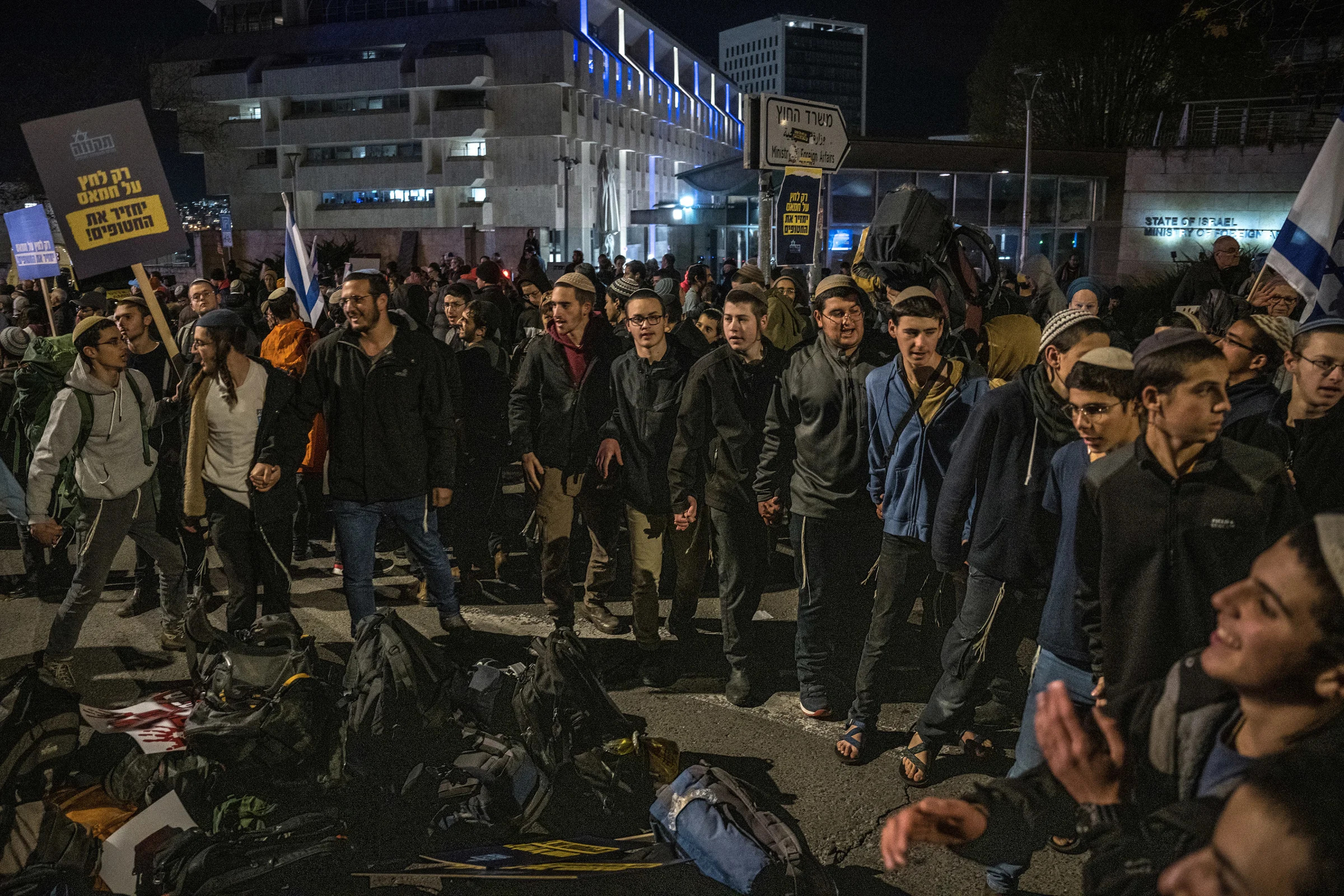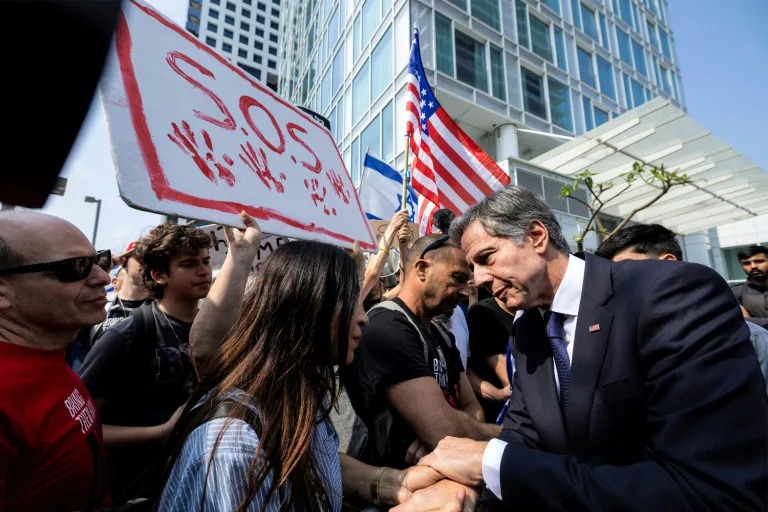Far-right Israelis gather in front of the Israeli Parliament to protest a possible cease-fire with Hamas, in Jerusalem, Feb. 8, 2024.
For months, Prime Minister Benjamin Netanyahu of Israel has avoided detailed public discussion about the Gaza Strip’s postwar future. Trying to placate both his far-right allies, who seek to rebuild Israeli settlements in Gaza, and Israel’s foreign partners, who want Gaza returned to Palestinian governance, Netanyahu has stopped short of any specific declaration.
Behind the scenes, however, senior officials in his office have been weighing an expansive plan for postwar Gaza, in which Israel would offer to share oversight of the territory with an alliance of Arab countries, including Egypt, Saudi Arabia and the United Arab Emirates, as well as the United States, according to three Israeli officials and five people who have discussed the plan with members of the Israeli government.
According to that proposal, Israel would do so in exchange for normalized relations between itself and Saudi Arabia, according to the people, who spoke on the condition of anonymity given the sensitivity of the matter.
AfriPrime Android Web View app on Amazon Adroid app store.... https://rb.gy/3xek46
Far-right members of Netanyahu’s coalition are almost certain to dismiss such an idea, and so are the Arab countries mentioned as possible participants. But it is the clearest sign yet that officials at the highest levels of Israel’s government are thinking about Gaza’s postwar future, despite saying little in public, and could be a starting point in future negotiations.
The disclosure comes against the backdrop of intense international efforts to get Israel and Hamas to agree to a cease-fire that could eventually become a permanent truce, and it follows growing pressure on Israel to plan for what comes next. Israel’s reluctance to determine how to govern Gaza has created a power vacuum in much of the territory, leading to lawlessness and worsening the dire humanitarian situation.
Arab officials and analysts have called the power-sharing plan unworkable because it does not create an explicit path toward a Palestinian state, which the Emirati and Saudi governments have said is a prerequisite for their involvement in postwar planning. But others have cautiously welcomed the proposal because it at least suggests greater flexibility among Israeli leaders than their public statements suggest.
Under the proposal, the Arab-Israeli alliance, working with the United States, would appoint leaders in Gaza to redevelop the devastated territory, overhaul its education system and maintain order. After between seven and 10 years, the alliance would allow Palestinians to vote on whether to be absorbed into a united Palestinian administration that would govern in both Gaza and the Israeli-occupied West Bank, according to the proposal. In the meantime, the plan suggests, the Israeli military could continue to operate inside Gaza.
The proposal does not explicitly say whether that united administration would constitute a sovereign Palestinian state, or if it would include the Palestinian Authority, which administers parts of the West Bank. Publicly, Netanyahu has rejected the idea of full Palestinian sovereignty and all but ruled out the involvement of the Palestinian Authority.
The Israeli prime minister’s office declined to comment.
AfriPrime Android Web View app on Amazon Adroid app store.... https://rb.gy/3xek46
The proposal lacks detail and has not been formally adopted by the Israeli government, which publicly has presented only a vaguer vision under which Israel would retain greater control over postwar Gaza.
Emirati and Saudi officials and analysts said the new proposal would not secure the involvement of Arab states like Saudi Arabia and the UAE, particularly because it stopped short of guaranteeing Palestinian sovereignty and would permit continued Israeli military operations inside Gaza. The Saudi government has said it will not normalize ties with Israel unless Israeli leaders take irrevocable steps toward creating a Palestinian state.
“The details need to be more explicitly laid out in a manner that is ‘irreversible,’” said Ali Shihabi, a Saudi commentator considered close to the Saudi royal court. “The problem is the Israelis have a habit of hiding behind ambiguous terms, so I think the Saudi government would be looking for such clarity.”
Still, the proposal is the most detailed plan for postwar Gaza that Israeli officials are known to have discussed, and parts of it align with ideas articulated by Arab leaders both in public and in private.
Thomas R. Nides, a former U.S. ambassador to Israel who has been consulted on the plan, said the proposal was significant because it revealed internal Israeli thinking.
“It shows that despite the Israeli government’s public posture, behind the scenes Israeli officials are thinking seriously about what a postwar Gaza would look like,” Nides said. “Obviously the devil is in the details, which may not be enough to coax Arab partners like the UAE to engage in the plan. And nothing can happen until the hostages are released and a cease-fire starts.”
The disclosure of the plan comes amid renewed efforts to seal a truce between Israel and Hamas.
A group of businesspeople, most of them Israeli, some of whom are close to Netanyahu, drew up the plan in November. It was first formally proposed to Israeli officials in Netanyahu’s office in December, according to one of the government officials.
AfriPrime Android Web View app on Amazon Adroid app store.... https://rb.gy/3xek46
Two of the officials said the plan was still under consideration at the highest levels of Israel’s government, though it cannot be put in place until after Hamas is defeated and the remaining hostages in Gaza are released.
Hamas remains in full control of parts of southern Gaza, despite a devastating Israeli military campaign that has killed more than 34,000 people, according to officials there; brought parts of the territory to the brink of famine; and left much of Gaza in ruins.
The businesspeople, who asked not to be named in order not to jeopardize their ability to promote the idea, said they had briefed officials from several Arab and Western governments, including the United States, Egypt, Saudi Arabia and the UAE, on the plan.
It has also been shown to Tony Blair, the former British prime minister who runs an institute advising the Saudi government on modernization projects. A Palestinian businessperson, who asked not to be named in order to protect his relatives from retribution in Gaza, also has been involved in promoting the idea to U.S. officials.
Asked about the plan, the UAE foreign ministry said in a statement that the Emirati government “will not participate in any reconstruction effort in Gaza until there exists an agreement on a road map for a political solution to the conflict, which includes a transparent, timely and binding path for all parties and that leads to the establishment of the two-state solution, with an independent Palestinian state.”
A Saudi official, speaking on condition of anonymity to conform with government protocol, dismissed the proposal because it did not create a “credible and irreversible pathway” toward Palestinian statehood or ensure the Palestinian Authority’s involvement. The official also denied that the Saudi authorities had previously been made aware of the plan.
A spokesperson for the Egyptian government declined to comment.
The aim of the businesspeople is to win international support for the idea in order to convince Netanyahu that it would be worth his embarking on the difficult task of winning domestic backing for it.
Netanyahu’s coalition government could collapse if he formally backed a plan that did not conclusively rule out the creation of a Palestinian state. Far-right members of his coalition strongly oppose Palestinian sovereignty and want to reestablish Israeli settlements in Gaza. They have threatened to bring down the government if Netanyahu ends the war in Gaza without ousting Hamas.
AfriPrime Android Web View app on Amazon Adroid app store.... https://rb.gy/3xek46
Polling shows that a majority of Israelis also oppose the creation of Palestinian state, which many say would reward Hamas for leading terrorist attacks that killed some 1,200 people on Oct. 7, during the cross-border raid on Israel that started the war.
Wary of both collapsing his government and losing support in a subsequent election campaign, Netanyahu has repeatedly voiced his opposition to a Palestinian state in recent months, pledging to retain Israeli control over the West Bank and Gaza.
But analysts and some of his allies believe that he would be prepared to leave open the notional possibility of Palestinian sovereignty if it allowed him to seal a landmark normalization deal with Saudi Arabia.
Forging diplomatic ties with the most influential Arab state would allow Netanyahu to restore some of his political legacy, which has been tarnished because the Hamas-led raid on Israel, the deadliest single attack in Israeli history, occurred under his watch.
“He wants this legacy,” said Nadav Shtrauchler, an Israeli political analyst and former strategist for the prime minister.
“On the other hand, one, he doesn’t believe in the two-state solution. Two, he cannot pitch it to his crowd,” Shtrauchler added.
At Gaza border, Blinken sees hope on aid but seeks more
US Secretary of State Antony Blinken meets with families of hostages taken by Palestinian militants during the October 7 attacks, as they gather outside a hotel in Tel Aviv on May 1, 2024
After applying months of pressure on Israel to do more on aid, US Secretary of State Antony Blinken had a first-hand look Wednesday at trucks on the Gaza border.
Under tight security including armoured cars, Blinken made his first stop to near areas targeted in Hamas's October 7 attack on Israel.
Blinken, both in Israel and on earlier stops in Jordan and Saudi Arabia, highlighted progress on delivering aid to Gaza -- a bright point in his diplomacy as negotiations drag on a ceasefire and after he directly clashes with Prime Minister Benjamin Netanyahu on Israeli plans to assault the crowded Gaza city of Rafah.
Blinken travelled to Kerem Shalom, just a few kilometres (miles) from Rafah, where he saw dozens of trucks waiting to enter -- as well as several Israeli military tanks parked nearby.
AfriPrime Android Web View app on Amazon Adroid app store.... https://rb.gy/3xek46
"The progress is real, but given the immense need in Gaza, it needs to be accelerated. It needs to be sustained," Blinken told reporters afterwards as he visited the port of Ashdod, also reopened to aid after US appeals.
Blinken was escorted past trucks loaded with onions and 50-kilogramme sacks of rice by Defence Minister Yoav Gallant and offered an upbeat assessment of Israel's efforts.
Gallant in a statement said he discussed "how to expand humanitarian assistance to Gaza".
Shimon Freedman, a spokesman for COGAT which coordinates Israeli policy in the occupied territories, insisted on Israel's goodwill and said that 98.5 percent of shipments were getting through without Israeli objections.
But the United Nations has warned of famine in the Gaza Strip and US officials say they have heard of deaths from malnutrition in the territory, where nearly the entire population has been displaced.
Blinken has called on Israel to draw up a list of goods that would not be subject to arbitrary denial and clearing more drivers to enter the Gaza Strip.
- Jordanian aid -
Before the visit to Kerem Shalom, Blinken travelled to Nir Oz kibbutz, destroyed by Hamas on October 7, and saw the home of the Kedem Siman Tov family of five US citizens who were killed that day.
Doors remained blackened by fire and debris from chairs was littered in the garden, where a peacock unexpectedly came out to stroll.
The unprecedented attack by Hamas on southern Israel resulted in the deaths of around 1,170 people, mostly civilians, according to an AFP tally based on Israeli official figures.
Israel's retaliatory bombardment and ground offensive in Gaza, aimed at destroying Hamas, has killed at least 34,568 people, mostly women and children, according to the health ministry in the Hamas-run territory.
Kerem Shalom has become a symbol of US efforts to press Israel into allowing more humanitarian assistance into Gaza after the October 7 attacks.
After initially blocking all deliveries into Gaza, Israel reopened the crossing in December under US pressure.
Near Amman on Tuesday, Blinken saw off the first truck convoy of aid supplies from Jordan to go through Erez.
Israel in April also agreed to reopen to aid the Ashdod port near Gaza, which Blinken also visited on Wednesday, as well as a second crossing from Israel to northern Gaza at Erez.
AfriPrime Android Web View app on Amazon Adroid app store.... https://rb.gy/3xek46
The Israeli moves came after President Joe Biden warned that his support was on the line after an Israeli strike killed seven aid workers from the US-based charity World Central Kitchen.
The Israeli government has repeatedly blamed aid groups and the United Nations for not distributing aid more quickly, but they have accused Israel of holding up deliveries with onerous restrictions and inspections.
- Well-wishing protesters -
The humanitarian situation has brought outrage across the world and fuelled major demonstrations at US universities, a cause of concern for Biden in an election year.
In a rare scene, Blinken was greeted by well-wishing crowds outside his hotel in Tel Aviv who called on him to press Netanyahu to agree to a truce and a deal to free hostages.
"Thank you, Biden! Thank you, Blinken!" they chanted, waving both US and Israeli flags.
Blinken, who also met privately with hostage families, told them that freeing the hostages seized by militants on October 7 was "at the heart of everything we're trying to do".
"We will not rest until everyone -- men, women, soldier, civilian, young, old -- is back home," he said.
But Blinken says the onus is on Hamas which had yet to accept the latest proposal in the truce negotiations.




